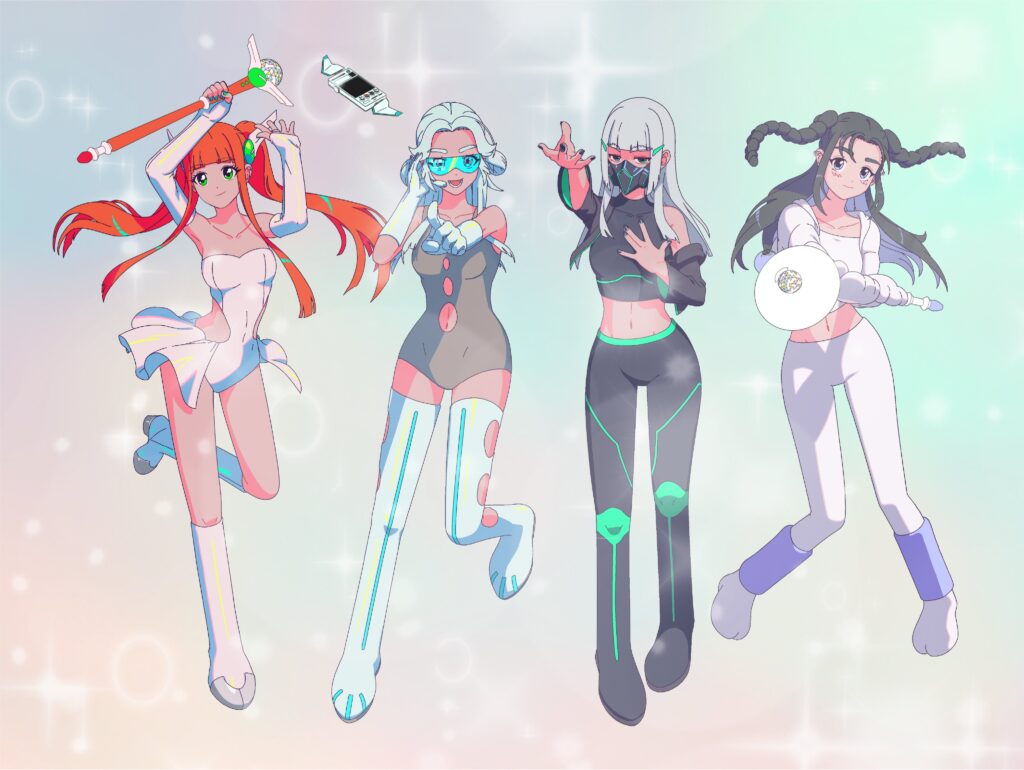As virtual bands increasingly capture the spotlight in South Korea’s music scene, several K-pop powerhouses have ventured into the realm of digital idols. Despite their efforts, many of these virtual beings have yet to achieve the same level of attention and acclaim as their human counterparts.
Virtual Idols Making Waves
Since 2021, the VTuber idol group Isegye Idol has been a prominent player in the virtual idol scene, making substantial domestic and international waves. Their digital singles have charted successfully, setting a high bar for virtual bands. Following Isegye Idol’s success, several other virtual groups, including RE: REVOLUTION and PLAVE, have emerged, aiming to carve out their niches in the industry. Notably, PLAVE has made headlines by being named the top artist of the week on a significant terrestrial TV music show in March 2024. This achievement was remarkable because the group outperformed competitors with well-established fan bases.
The rise of virtual artists has injected a new dynamic into the K-pop world, which has long been dominated by idol groups from major entertainment agencies like SM Entertainment, YG Entertainment, and HYBE. The traditional K-pop industry, emphasising human performers and their charismatic appeal, now faces the challenge of integrating digital idols into its established framework.
Agency Attempts and Challenges
Despite the burgeoning interest in virtual idols, major K-pop agencies have struggled to replicate the success of earlier digital pioneers. YG Plus, a subsidiary of YG Entertainment known for managing global sensations like BLACKPINK, made headlines with their virtual idols Sae Na and Ayan’s launch in October 2022. The agency had ambitious plans, including merchandise and music centred around these digital personalities. However, by February 2024, Sae Na and Ayan had vanished from social media. Their last posts suggested a break for “overseas studies”, leaving fans and industry observers questioning the future of these virtual characters.

SM Entertainment, another major player, entered the virtual idol arena with Naevis, its first virtual human, in July 2024. Naevis debuted during an aespa concert in Seoul, appearing as a three-dimensional digital performer created using advanced anamorphic illusion technologies. Scheduled to release her debut single in the third quarter of 2024, Naevis has already sparked debate among fans. Many are sceptical about her potential success as a solo artist, given her close ties to Aespa’s lore. “The character is deeply related to aespa’s lore – I don’t see the point of debuting her as an independent artist,” commented a fan on X (formerly known as Twitter), reflecting concerns about her standalone viability.
HYBE’s Bold Move and Criticisms
The latest example of a major agency venturing into the virtual idol trend comes from HYBE, the powerhouse behind BTS. HYBE’s AI start-up, Supertone, launched its first virtual idol group, SYNDI8, in June 2024. SYNDI8 consists of four members who are designed in a cartoon style, with their voices generated by AI. Unlike virtual idols like Isegye Idol and PLAVE, SYNDI8 lacks human performers altogether. Instead, the group communicates through animations and text-to-speech tools.

Despite the innovative approach, SYNDI8 has faced considerable criticism. Critics have pointed out similarities between the band’s name and its members’ names to existing K-pop idols, such as SEVENTEEN’s The8 and aespa’s Karina. Additionally, there has been backlash over using AI-generated voices rather than human ones. Some fans have also raised concerns about potential plagiarism related to the band’s concept and artwork, adding to the controversy surrounding SYNDI8.
Market Trends and Future Prospects
The market for virtual artists is poised for significant growth, bolstered by the involvement of major entertainment agencies and AI tech experts. According to Global Information, the United States and Canada market is projected to expand from USD 144 million in 2023 to USD 596 million by 2029. Similarly, the Chinese market is expected to grow from USD 247 million to USD 1.1 billion during the same period. These projections highlight the increasing potential for virtual artists to make a substantial impact.
A venture capital associate interviewed by ChosunBiz noted that while trends related to the metaverse and virtual reality have lost some of their initial appeal, advanced VTubers and virtual idols continue to gain traction. “VTubers with advanced technologies, which seem to have evolved from earlier trends, will only grow from here,” he said. “The global VTuber and virtual idol markets, in particular, appear to be a blue ocean for exploration.”
For entertainment agencies to succeed in leading the virtual idol market, understanding and addressing fan perceptions will be crucial. As HYBE IM CEO Wooyong Chung highlighted last May, the company is cautious about technology-focused projects. Instead, HYBE aims to use technology to enhance artistic expression. Regarding their AI-assisted artist MIDNATT, Chung emphasized the importance of fan feedback, stating, “To ensure success, I need to listen to what fans think of MIDNATT’s work first.”



